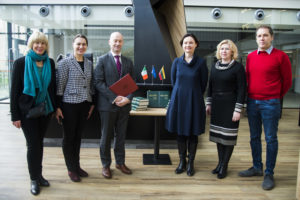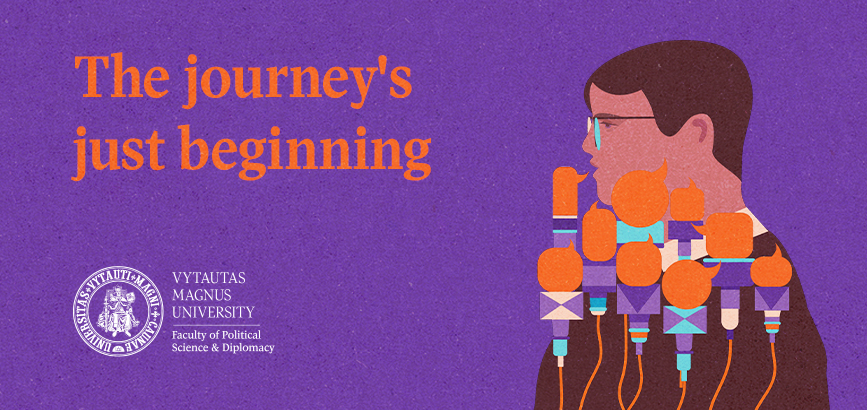Public lecture about the Parliamentary elections in Italy
On Wednesday, March 21st, at 1.15 p.m. Putvinskio street 23, auditorium 311, Prof. Angela Di Gregorio from the University of Milan will give public lecture „The political and constitutional situation of Italy in the context of Parliamentary elections of March 4, 2018“.
She will review the last political and constitutional changes in Italy (failed 2016 constitutional referendum, creating crisis, new election law) and discuss the recent Parliamentary elections which were held on March 4, 2018 (participants, results and difficulties of government formation).
We invite all the students interested in elections and Italian politics.
Studentės įspūdžiai atliekant Lozoraičių fondo remiamą stažuotę Romoje

PMDF Diplomatijos ir tarptautinių santykių magistrantė Emilija Giedraitytė dalinasi savo įspūdžiais:
“Esu labai dėkinga Politikos mokslų ir diplomatijos fakultetui ir visiems, kurių dėka man teko garbė atstovauti Vytauto Didžiojo universitetą Italijoje, LR ambasadoje. Antrą savaitę esu ambasados kolektyvo dalimi, atlieku man pavestas įvairias tiek administracines, tiek analitines, politines užduotis. Artėjant svarbiausiai 2018-ųjų metų sukakčiai Lietuvoje – Valstybės atkūrimo šimtmečiui – turėjau galimybę prisidėti prie kultūrinių renginių viešinimo, organizavimo Italijoje. Man didelė garbė, kad ambasadorius ir kiti diplomatai pasitiki manimi ir leidžia padėti. Ambasada yra puiki vieta praktiškai pritaikyti tiek paskaitose, tiek kitų stažuočių metu įgytas žinias ir įgūdžius. Mokytis iš savo srities profesionalų taip pat yra geriausias būdas pažinti darbo specifiką, diplomatinio bendravimo niuansus.
Nuo vaikystės, Lozoraičių vardas man siejosi su garbingu valstybės atstovavimu, diplomatija aukščiausiame lygmenyje, nepriklausomybės dvasia, elitu, kilnumu. Nuo šiol ir aš esu nedidelė šios sąsajos dalis. Man tai reiškia ne tik garbę, bet ir atsakomybę toliau oriai reprezentuoti valstybę ir universitetą, kad ir kur bebūčiau, skleisti „vilties prezidento“ keltas idėjas ir viešinti šią pavardę Lietuvoje ir užsienio šalyse”.
4th Annual Conference: ‘Contemporary Political Processes: Challenges and Opportunities’
CALL FOR ABSTRACTS
4th Annual Conference: ‘Contemporary Political Processes: Challenges and Opportunities’
The conference is organized by the Faculty of Political Science and Diplomacy and hosted by Vytautas Magnus University. It aims to provide young scholars with an opportunity to share their research with a wide audience of scholars engaged in diverse study fields within the discipline of political science.
Due to the emphasis on young scholars, master and doctoral students are especially encouraged to submit their presentation proposals within these broad thematic fields:
– Lithuania in the Global World;
– Changes in Global Security, Contemporary Military Conflicts and their Resolution;
– Regional Studies;
– Governance and Public Administration;
– News Outlets, Social Media and Information warfare;
– Ideologies and their Relevance in Contemporary Politics;
– Political Participation;
– #Metoo and other Movements;
– Other thematic fields are welcome.
The conference will take place in small hall of VMU’s central venue (Daukanto 28, Kaunas), 20th April, 2018. Working languages are Lithuanian and English.
Abstracts should be submitted to dr. Gerda Jakštaitė via e-mail (gerda.jakstaite@vdu.lt). They should not exceed 200 words and are expected to be submitted until 28th March, 2018. Best presentations will be considered for publication in a peer-reviewed journal Lithuanian Foreign Policy Review.
Organizing Committee:
Dr. Gerda Jakštaitė
Dr. Giedrius Česnakas
Justinas Juozaitis
Aistė Žemaitytė
For further inquiry: dr. Gerda Jakštaitė (gerda.jakstaite@vdu.lt)
Public A. Bininachvili’s lecture: Global energy geopolitics

February 23, 2018 (on Friday) VMU Faculty of Political Science and Diplomacy will be visited by Albert Bininachvili, expert of Persian Gulf and energy geopolitics. He will deliver a public lecture on current developments in the area of energy geopolitics in the Persian Gulf region. After the lecture there will be a discussion moderated by VMU FPSD prof. Arunas Molis.
The lecture is obligatory for students of the VMU FPSD Bachelor’s program II course “Great powers in international relations”, but is open to all interested in Persian Gulf region and the developments in energy geopolitics.
Read more about the guest here:
https://www.unibo.it/sitoweb/albert.bininachvili/cv-en
February 23, 16h, Small Hall of Vytautas Magnus University, Daukanto str. 28
Public Lecture About Propaganda and Misinformation
Department of Political Science would like to announce a public lecture Living on the information front line: Lithuanian experience with hostile propaganda and Misinformation
Lecture will be held by Tomas Čeponis, Senior Specialist of Department of Strategic Communication in Lithuanian Armed Forces.
All students are welcome to public lecture, which will take place on 19th of February, at 4.15 pm., in 311 room, Putvinskio 23, at Faculty of Political Science and Diplomacy.
Public Lecture about Hybrid Threats
Department of Political Science would like to announce a public lecture Hybrid threats: is it reality or fiction? How are European Union institutions and different countries protecting against hybrid threats?
Lecture will be held by Eitvydas Bajarūnas, Ambassador – at – Large for Hybrid Threats of Ministry of Foreign Affairs of the Republic of Lithuania, Member of Steering Board of the European Centre of Excellence for Countering Hybrid Threats in Helsinki.
All students are welcome to public lecture, which will take place on 12th of February, at 11.15 am., in 311 room, Putvinskio 23, at Faculty of Political Science and Diplomacy.
Irish Ambassador to Lithuania D. Noonan visited VMU
His Excellency David Noonan, Irish Ambassador to Lithuania, visited the Faculty of Political Science and Diplomacy (VMU). During his visit, the Ambassador donated books, lectured at the University, and met with university staff and students.
This visit is valuated as strengthening cultural and academic ties between Lithuania and Ireland. We believe that this cooperation will evolve into other great joint initiatives.























THE DIRECTOR OF NATO LECTURES IN THE FACULTY
The director of NATO Arms Control, Disarmament, and WMD Non-Proliferation Center William Alberque is going to visit Vytautas Magnus University’s Faculty of Political Science and Diplomacy on the 16th and 7th of November, 2017. William Alberque is going to give public lectures as well as interact with students.
William Alberque is an expert on arms control, international relations, and national security who has extensive knowledge and experience in the field of strategic planning and strategic communication. Before becoming the director of NATO Arms Control, Disarmament, and WMD Non-Proliferation Center, Mr. Alberque was the director of European Security in the United States Department of Defence and the U.S. Department of State as an expert on disarmament.
| Time | Place | Event |
|
November 16th 17:30 |
Putvinskio g. 23-311 | Lecture “Role of Multilateral Diplomacy in Contemporary World“ |
|
November 17th 14:50 |
Putvinskio g. 23-313 | Lecture “NATO‘s Dynamics after Ukraine Crisis“ |
|
November 17th 17:30 |
Donelaičio g. 52-403 | Lecture “NATO‘s Role in Interregional Cooperation“ |
The events are held and lectures are given in English.
Dr. Peck and Dr. J.D. Mininger will present their book
 Dr. Jason Michael Peck (University of Rochester, U.S.A.)
Dr. Jason Michael Peck (University of Rochester, U.S.A.)
“The Poetics of Debt: a Genealogy”
Following the lecture and subsequent discussion, Dr. Peck and Dr. J.D. Mininger will present their book German Aesthetics: Fundamental Concepts from Baumgarten to Adorno (2016, Bloomsbury).
Dr. Peck is a scholar of German-Jewish philosophy and comparative literature, formerly a professor in the department of Modern Languages and Literature at the University of Rochester, now a Research Fellow at the Center for Faith and Human Flourishing at LCC International University for 2017-2018. He is co-editor of German Aesthetics: Fundamental Concepts from Baumgarten to Adorno, author of articles on (among other topics) Kantian philosophy, Jewish contributions to German Idealism and early Romanticism, and political theology in the works of Paul Celan and Jacob Taubes. His lecture is drawn from a forthcoming book entitled The Poetics of Debt: Political Theologies From TheMerchant of Venice to the Occupy Movement (Brill).
Friday, Nov. 10, 3:30pm, Room 106, Putvinskio str. 23
Public lecture about Ukrainian political tradition
Department of Political Science is inviting to public lecture Hard ways to Ukrainian independence. The lecture will be given by Iurii Perga from Igor Sikorsky Kyiv Polytechnic Institute.
I.Perga – Ukrainian historian, was born in Kyiv and finished Historical Faculty of Taras Shevchenko National University. Prepared and finished Ph.D. thesis at the Department of History in Igor Sikorsky Kyiv Polytechnic Institute. Currently working as a senior lecturer in this Institute. Main field of academic interests – history of Ukrainian-Polish relations in the interwar period, history of civil initiations.
The public lecture will be held in English, on 13-th of November (Monday), at 11.15 am. (310 room, Putvinskio 23).












